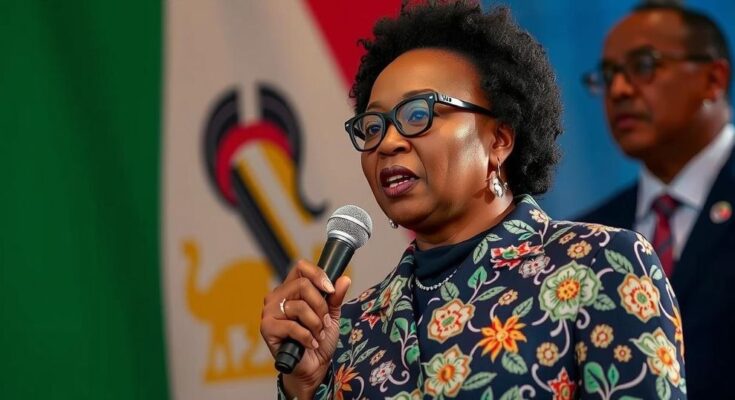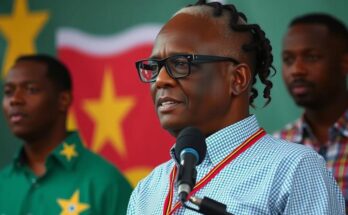Namibia has elected its first female president, Netumbo Nandi-Ndaitwah, securing 57% of the votes in a controversial election. Nandi-Ndaitwah, a seasoned politician, previously served as vice-president and has roots in the independence movement. However, opposition parties have raised concerns about voting irregularities, intending to challenge the results. This election reflects changing voter sentiments towards established political entities in Namibia and Southern Africa at large.
Namibia has made history by electing its first female president, Netumbo Nandi-Ndaitwah, following the recent presidential election that solidified the ruling Swapo party’s dominance for 34 years. Nandi-Ndaitwah, who has served as vice-president, secured 57% of the votes, surpassing expectations that suggested a possible runoff vote. Her election comes in a time when opposition criticism of the electoral process has surfaced, citing various technical difficulties that marred the election, including ballot shortages and disputed voting extensions.
At the age of 72, Nandi-Ndaitwah expressed her gratitude after the results were announced, stating, “The Namibian nation has voted for peace and stability.” Her political journey began with her involvement in the underground independence movement in the 1970s. Following the demise of her predecessor, President Hage Geingob, she transitioned from foreign minister to vice-president in February.
Despite her personal electoral success, the Swapo party noted a decline in parliamentary votes, securing only 53% compared to 65% in the previous election. The outcome is indicative of changing sentiments among voters, particularly among younger demographics who have recently shown discontent with established liberation movements across southern Africa. Opposition leaders, such as Panduleni Itula, who received 25.5% of the vote, plan to legally challenge the election results due to alleged irregularities.
This election signifies a pivotal moment for Namibia, which defies regional trends where prominent liberation parties have faced electoral setbacks amid rising youth unrest and demands for accountability. The outcome illustrates a unique situation as candidates affiliated with liberation movements manipulate continued support while navigating political scrutiny.
The recent presidential election in Namibia has been significant as it marks the election of the nation’s first female president, Netumbo Nandi-Ndaitwah. This event is historically important within the context of Namibia’s political journey since its independence in 1990, where the Swapo party has consistently held power. The election process, however, was not without controversy, as significant irregularities were reported, raising questions regarding its integrity. Nandi-Ndaitwah’s prior roles in government and the independence movement also provide a brief on her experience and political credibility leading up to her election.
In conclusion, Namibia’s election of Netumbo Nandi-Ndaitwah as the first female president amid disputed circumstances presents a complex balance of tradition and change in Southern African politics. While her victory affirms Swapo’s continued influence, the opposition’s concerns regarding electoral integrity highlight the shifting political landscape. As Namibia moves forward under Nandi-Ndaitwah’s leadership, her role will be pivotal in navigating the challenges posed by growing political scrutiny and public demand for accountability.
Original Source: www.theguardian.com



